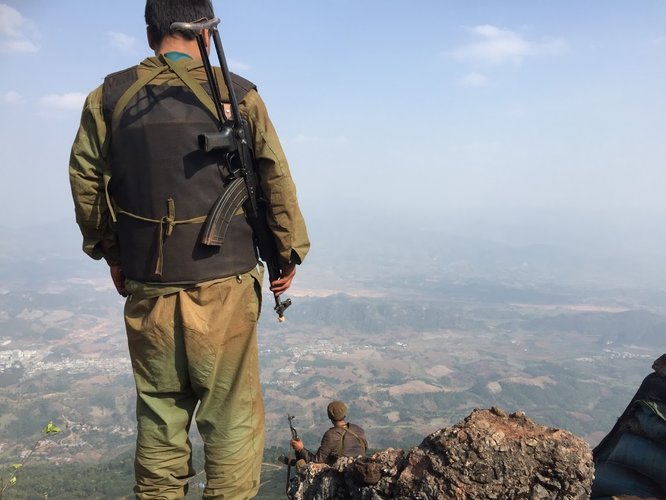Burma’s Commander-in-Chief Snr-Gen Min Aung Hlaing says there is “no prospect for peace” with the ethnic Kokang militants of the Myanmar National Democratic Alliance Army (MNDAA) as it was they who provoked fighting in Laogai by attacking government forces first.
State-run newspaper Myanmar Ahlin on Tuesday reported the army chief made the remark at a meeting with the Interim Press Council on 24 August. He added that the only way to end hostilities is for the MNDAA and the Kachin Independence Army (KIA) 4th Brigade to surrender their arms.
Referring to the ongoing fighting in the northeast of the country, Min Aung Hlaing noted that the KIA faction was fighting alongside the MNDAA, but also said that two other ethnic armed groups that were allied in the hostilities against the Burmese army – the Ta-ang National Liberation Army (TNLA) and Arakan Army (AA) – are still regarded as “negotiable for peace”.
Posting on his Facebook page, Min Aung Hlaing said that at a meeting last week with British Ambassador Andrew Patrick, he had emphasised that after the signing of the Nationwide Ceasefire Agreement (NCA) the ethnic groups must be prepared to discuss procedures on Disarmament, Demobilisation and Reintegration (DDR) and Security Sector Reform (SSR).
At Monday’s meeting with the Interim Press Council, the commander-in-chief reportedly tried to allay ethnic fears by insisting that armed groups who sign the NCA will not be required to immediately lay down their arms or demobilise, but that they must discuss DDR and SSR procedures for the future.
Hkun Okker, a leading representative of the ethnic alliance’s negotiating team and a member of its Senior Delegation, said the ethnic delegates agree with the DDR and SSR procedures provided for in a draft ceasefire document signed in March.
“We will deal with the SSR and DDR procedures as provided for in the NCA, which specifies that they must be included on the agenda within the rounds of political dialogue that follow the signing of the [ceasefire] agreement,” he said. “However, there is no proviso that these procedures are to be implemented straight away, only that they will be based on the outcome of the final Union Peace Conference [the final stage of the peace process].
[related]
“So we have no plan to implement SSR and DDR procedures within the next three to five years while we are engaged in political dialogue,” he said. “During that period, we should be able to live peacefully in our own territories, with our arms.
“As we are only agreeing to the NCA, any procedures suggested that differ from that agreement are simply not relevant to us.”
At the end of its summit in Chiang Mai from 21 to 24 August, the Senior Delegation appointed representatives of five major ethnic armed groups – Karen National Union, Kachin Independence Organisation, Karenni National Progressive Party, New Mon State Party and Shan State Progressive Party – to negotiate with Burmese President Thein Sein and Min Aung Hlaing in Naypyidaw, a meeting expected to take place in early September, when the ethnic delegates will push for the inclusion of all its alliance members, including the MNDAA, TNLA and AA in the nationwide ceasefire.
The five ethnic representatives are expected to accompany three members of the Senior Delegation to the Burmese capital for what could be pivotal talks.



